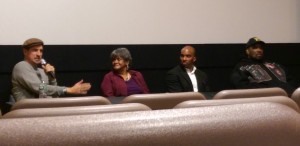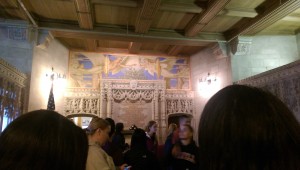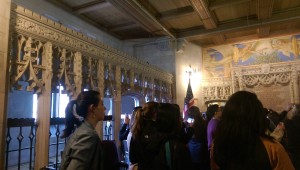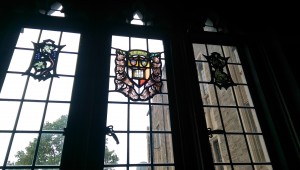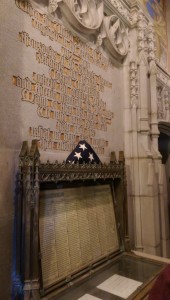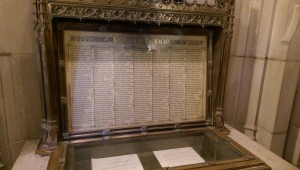The first thing I have to say is that this production was amazing. Not only was the play written really well, the actors gave a great performance. There ended up being several unused tickets from Rose which was a real shame because it was a fantastic.
This was my first time at the Kitchen Theater and I was pretty surprised by the whole experience. It was a small theater with a ground level performance area and limited seating on three sides surrounding the stage, making every seat a pretty good seat. Outside the stage area, people gathered before the show where there was food and wine being served.
Before the play began, one of the theater’s workers came out to introduce it and talked about the Kitchen Theater. The play was written pretty recently and has had numerous productions. She mentioned how it was clear that the playwright made bold decisions. She also asked who had been its patrons for the past 25 years, and there were several people who raised their hands. She then asked who was visiting for the first time, and even more people raised their hands. When she asked one person why he had come for the first time, he said that it because his wife told him he had to. I promise I have a point in telling this.
Spoilers Ahead
As the play started, I was surprised at the quality of the production. The rain and its sounds from outside the window and the amount of detail in the set (which I guess is pretty necessary when the theater is so intimate), was great. The play started off with MLK settling into his room and calling for some coffee. A little bit later, Camae comes in with some coffee and a newspaper to cover herself from the rain. MLK is clearly intrigued by her and they start talking about the civil rights movement and his speeches. It felt sort of weird seeing MLK flirting with the maid, especially because he had just called home to talk with his wife and say good night to his daughter.
The portrayal of this American hero as a human who smokes, drinks, and possibly cheats was very jarring. At times, it was sort of uncomfortable to watch. As they talk, the rain keeps coming down and whenever lightning and thunder occur, MLK is super sensitive to it, causing the audience to worry about his health. As Camae pushes his buttons about how marching is not effective enough, MLK starts to break a little. He talks about Larry Payne, a sixteen year-old innocent boy shot by the police. What broke my heart was the fact that 50 years later, the same thing is still happening. The language sounded so familiar and resonant, but this happened during civil rights movement, something we tend to think of as in the past and as history, but stories of racial police crimes happening is still (perhaps more) prevalent today.
Camae is still not satisfied with his pacifist ways of fighting the system and decides to emulate him and give a speech on what she would say if she had the influence of MLK. It sounded amazing, but it made me think about why we trust effective speakers. This was an actor performing words written for a character she is portraying, but it still felt genuine and real. When politicians make rousing speeches and the like, why are we inclined to rally and support them. I just found myself thinking about all the people who are particularly good public speakers and how I always feel dubious when someone is so clean when speaking confidently. To me, sometimes it just doesn’t feel genuine, perhaps because it feels too rehearsed.
Afterwards, they talk some more about violence versus peace and end up talking about heaven. Clearly from his background, MLK wants reassurance that God is pleased with his work, and Camae insists that she is happy and is “in like” with him. As the next lightning strikes and MLK grabs his heart in response to thunder, she freaks out. Camae tries to calm him down but starts calling him Michael. At first, I was confused because I had always thought, he’s a Jr., his name isn’t Michael, did the actor make a mistake? MLK suddenly gets enraged because only a handful of people knew about his Christian name and becomes convinced that she’s a spy sent to seduce him and starts to look around the room for wires and starts to push her out the door.
When he opens the door, snow falls onstage and is in awe that it’s snowing in April. “It snow sometimes in the spring here” was great comic relief, especially for an Ithaca audience, during such an intense struggle. MLK returns to freaking out thinking that he’s seeing things and that she’s drugged him and to finally shut him up, she reveals that she’s an angel. ! Plot twist!
She says that she was sent to take him to heaven. You’d think he might start freaking out again. But instead he’s curious about God (who is apparently a black woman more beautiful than you can imagine) and the circumstances of his death. When she reveals that it’s going to happen tomorrow, then he starts to properly freak out. He frantically tries to work on his speech because he doesn’t feel like he’s done enough, that he hasn’t finished what he set out to do. He tries to negotiate his way into having more time on earth and a frustrated Camae gives in and calls God on her cellphone. MLK speaks to God (we only hear his side) and states his case, and God hangs up on him. MLK gets sassy and Camae hits him with a pillow and starts a pillow fight which ends with a strange tickle fight and as it stops, he starts to break down.
He asks why he was given this task and that he’s just a man. He tries to call home to say goodbye to his wife and daughter one last time, but they don’t pick up because it’s late. As he recounts getting her flowers before he travels in the hopes that they won’t die before he returns, he remarks on how this time, he bought fake flowers, so they could last her forever. At this point, looking around at the audience, a bunch of people were wiping their tears, including myself. There were couples clinging to each other and the man at the beginning who came only because his wife told him he had to was fighting to keep his composure, but really couldn’t.
As he asks more about how he will die, he makes sure to ask about the future. About how the civil rights movement will proceed after he’s gone. The backdrop opens to a projector with names and events of the future (our past). MLK climbs up some steps and reaches for the light. “The baton passes on,” she says repeatedly, ending with Obama. As he continues to look into the light, he is amazed at what utopia the future could be. As he is finishing, he walks to the balcony of the hotel room and Camae comes in to take his hand and the play closes.
Overall, it was an amazing performance. The play was the perfect mix of comedic and tragic. The subject matter was provocative and the dialogue was eerily relevant. I would definitely recommend everyone see the play or at the very least read the script.
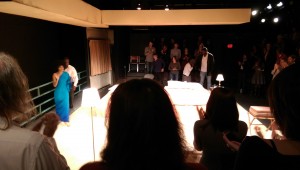
A standing ovation for the actors

